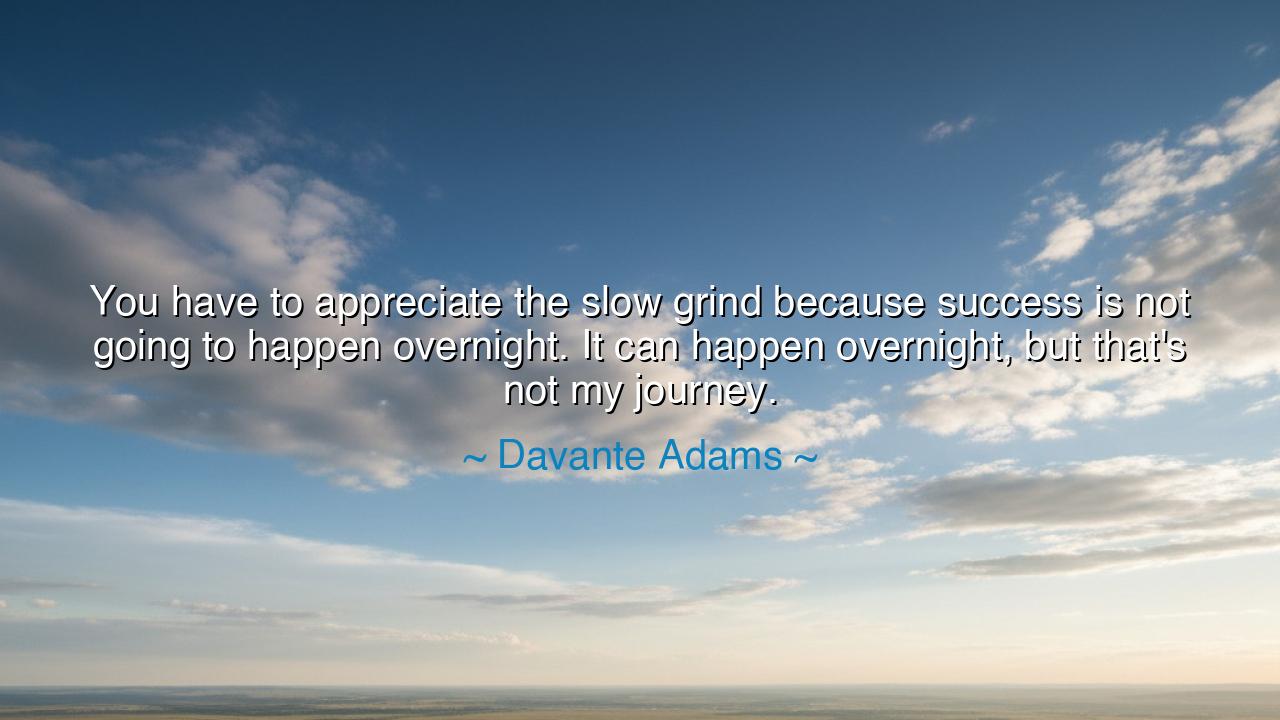
You have to appreciate the slow grind because success is not
You have to appreciate the slow grind because success is not going to happen overnight. It can happen overnight, but that's not my journey.






The words of Davante Adams, “You have to appreciate the slow grind because success is not going to happen overnight. It can happen overnight, but that’s not my journey,” are carved with the weight of patience and the wisdom of endurance. In them, we find the eternal truth that the path of greatness is not always swift, nor is it easily won. The slow grind—the long hours of labor unseen, the countless repetitions, the sacrifices endured in silence—this is the furnace in which true champions are forged. To despise this grind is to despise the very soil from which victory grows.
To the ancients, the meaning of this truth was familiar. They knew that an oak does not spring into majesty in a single season; it grows slowly, ring by ring, beneath storm and sun. The warrior trained with his spear for years before battle crowned him with glory. The philosopher labored through endless nights of thought before his words became immortal. Adams reminds us that success is not always a lightning bolt from the heavens—it is often a steady flame, tended carefully until its light fills the sky.
Consider the tale of Abraham Lincoln. Before he became one of history’s greatest leaders, he endured defeat after defeat: failed businesses, lost elections, deep personal sorrow. Decades of struggle marked his path. Many would have abandoned their pursuit, declaring fate too cruel. But Lincoln embraced the slow grind. Through it, he grew in wisdom, in humility, in resilience. And when the moment of destiny arrived—when the nation fractured and bled—he was ready, not by accident, not by sudden miracle, but by the steady preparation of years. His journey was not overnight, yet his triumph endures through the ages.
Adams himself speaks from the battlefield of sport, where young men dream of instant greatness, of records broken at the dawn of their careers. Yet his testimony is different: his rise came not in a burst of fortune, but in a steady climb, each practice sharpening him, each game teaching him. His journey reminds us that success earned slowly is not only deeper, but stronger, for it rests upon a foundation of discipline that cannot easily be shaken.
This teaching calls us to reframe how we see our own struggles. When progress feels too slow, when results hide themselves, we are tempted to despair. But the wise do not curse the pace; they appreciate the slow grind, knowing that each day of effort is a stone laid in the temple of their destiny. The grind is not punishment—it is the shaping of the soul into one strong enough to bear the weight of triumph. Overnight victories may dazzle, but they rarely endure. The lasting greatness is born in patience.
The lesson is clear: do not measure yourself against those who rise in an instant, nor envy those whose journey is not your own. Instead, honor your own path. Cherish the small steps, the daily acts of labor, the unseen victories of perseverance. For each of these is a thread in the tapestry of your ultimate success. To rush is to weaken; to endure is to strengthen.
Therefore, beloved, let your life be marked by patience and steadfastness. Rise each morning with resolve, not demanding harvest before its season, but trusting that the seed you plant in labor will bloom in time. When fatigue whispers, remember Adams’ words, and see the grind not as a curse but as a blessing. In its slowness lies your preparation, in its repetition lies your strength. Walk faithfully, and in due season you will stand upon the summit, rejoicing not merely in the prize but in the long and noble journey that brought you there.






AAdministratorAdministrator
Welcome, honored guests. Please leave a comment, we will respond soon